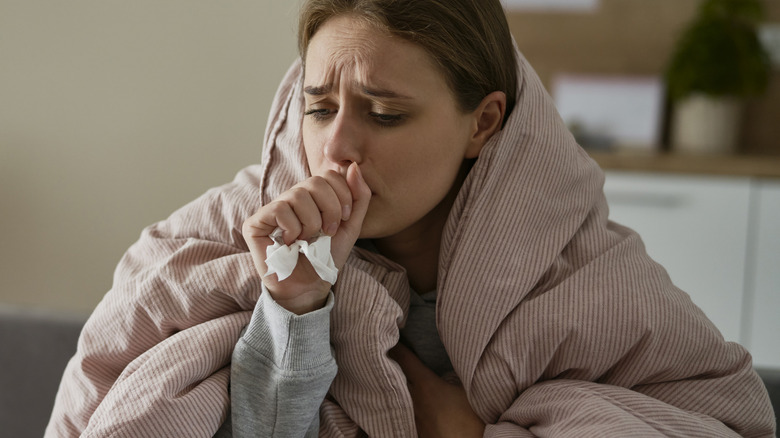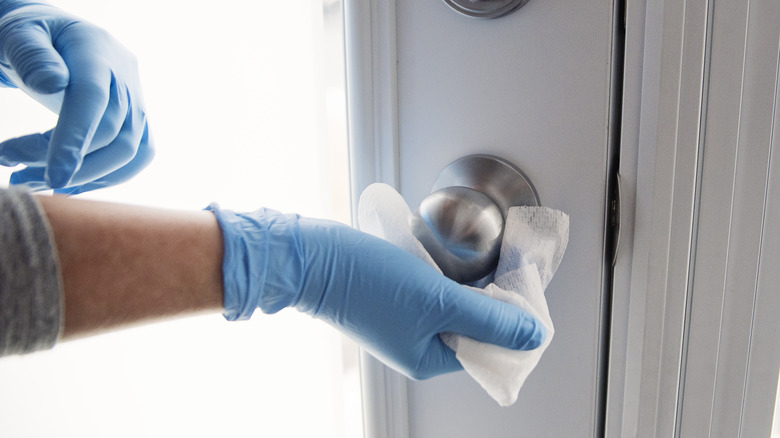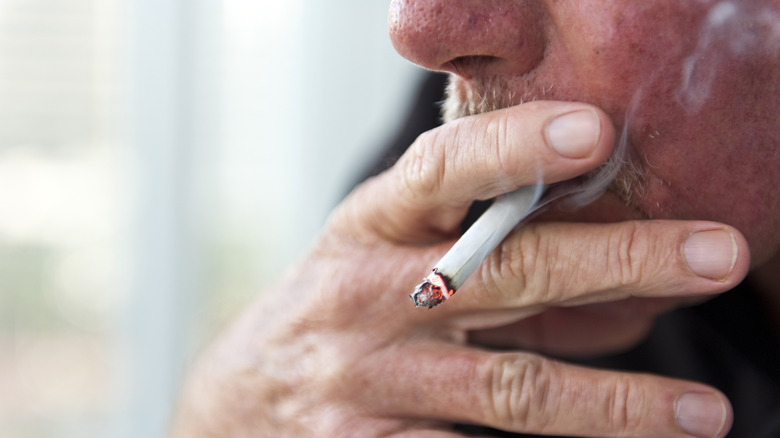Habits That Increase Your Risk Of Getting The Flu
Although we often hear the term "flu virus," there's actually more than one type of virus that can cause influenza (via the Centers for Disease Control and Prevention). And while there are different symptoms associated with the flu, exactly which symptoms someone experiences can vary for this potentially deadly illness. For example, fever is a possible red flag of having the flu, but it's possible to have the flu and not run a fever. Meanwhile, flu-related diarrhea and vomiting are less likely to happen to adults than to children.
Similarly, there are various ways you can get the flu. Experts say that the flu is spread either through droplets that can be spread when an infected person talks, sneezes, or coughs, or by coming into contact with something touched by an infected person and then touching one's eyes, nose, or mouth. Perhaps unsurprisingly, there are certain behaviors that can increase your risk of contracting the flu. In this article, we will be exploring these, as well as some precautions you can take to reduce your chances of getting the illness.
Exercising too much
Exercise can have many health benefits, like helping with blood pressure, per the Centers for Disease Control and Prevention (CDC). But too much might leave you more susceptible to the flu, according to TODAY. "Regular exercise is actually great for your body, good for your immune system," according to gastroenterologist Dr. Roshini Raj. "But if you're overdoing it, over-exerting yourself, you're not hydrating properly, you could actually depress your immune system and be more prone to getting an infection."
Additionally, MedlinePlus notes that when it comes to specific illnesses, exercise boosting immunity is theoretical. For example, exercise might help move white blood cells and antibodies more quickly throughout the body, which might allow them to defend the body better against illnesses. Would this keep a person from contracting the flu? In theory, maybe, but more research is needed.
So, how should one approach exercise during flu season? Dr. Raj has different recommendations depending on how often one is currently working out. For someone who already does physical activity on a regular basis, she recommends maintaining that routine. MedlinePlus also emphasizes that such individuals maintain their regular exercise routine instead of increasing exercise in an effort to improve one's immunity. Dr. Raj advises that someone new to working out begin by exercising for half an hour either daily or five days per week. With that said, it's wise to speak with a healthcare professional before starting or changing a workout routine.
Not cleaning your cellphone
As Alexander Tomich, manager of infection control at Loyola University Health System, told Everyday Health, a person's cellphone is "germ-infested." But cleaning one's cellphone can be a challenge since, as Forbes notes, there are cleaners and detergents that can kill germs but also damage a cellphone. However, that doesn't mean there aren't things you can do.
To understand how a cellphone can be a source of germs, let's look at what a person typically does with their cellphone. It's common for someone to use their cellphone in the bathroom, as well as let other people use their cellphone. Either scenario increases the odds of germs getting on the phone. And even though you can put calls on speaker phone, that's not always an option, and so when someone puts a cellphone against their face, their mouth could touch it and distribute germs on it. Is this as bad as someone with the flu not washing their hands and then touching your face? Not necessarily, but it could still increase your odds of being exposed to germs.
It's worth noting that there are sanitizing products that advertise that they're safe to use on cellphones. The most important thing is to do your research, so you can pick the best option for your specific device. Your phone's manufacturer may also have some specific instructions about cleaning your phone.
Not getting enough sleep
Flu season in the U.S. is also when a number of holidays take place (per the CDC). While holidays can certainly be happy occasions, they can also be stressful. For example, imagine a newlywed couple hosting a Thanksgiving dinner for their families for the first time. The pressure and extra work could lead to some sleepless nights. And as WebMD notes, missing out on sleep can increase the chances of getting sick.
T-cells are an important part of the immune system's line of defense against viruses and other pathogens, according to the Cleveland Clinic. Cytokines also contribute to defending the body by regulating inflammation (per the Cleveland Clinic). However, higher-than-normal levels of cytokines can lead to excessive inflammation. As Dr. Diwakar Balachandran, director of the Sleep Center at the University of Texas M.D. Anderson Cancer Center in Houston, told WebMD, "A lot of studies show our T-cells go down if we are sleep deprived. And inflammatory cytokines go up. ... This could potentially lead to the greater risk of developing a cold or flu."
Since stress can keep one up, the Mayo Clinic recommends writing down one's worries before turning in, so they can be addressed the next day. Meditating at bedtime may also help.
Not taking flu precautions at home
Imagine this scenario: Your friend, Alex, is very conscientious about his flu precautions whenever he leaves home. He always remembers to use hand sanitizer, and he stays away from situations where he'll likely encounter crowds (since that can raise the chances of being exposed to the viruses). By the time Alex gets home, he's ready to relax, spend time with his family, and stop thinking about his flu precautions.
But while Alex is doing many things correctly, he might not be doing enough to avoid the flu. Sure, Alex has exercised extreme caution, but what about the other members of his family? Have they also been as careful? If not, then they could be exposed to the flu. As pulmonary medicine physician Dr. Jock Lawrason told Everyday Health, during the winter, people want to stay inside where it's warm, which could increase the chances of spreading germs and getting sick.
Dr. Frank Lipman, an integrative and functional medicine physician, told Everyday Health that airing out one's home on a daily basis is good for the immune system. In addition, just as we use disinfectant wipes and hand sanitizer when we're outside our homes, we should also disinfect objects in our homes, especially if they have a high chance of being exposed to germs (e.g., a landline phone used by multiple members of a household).
Smoking
According to the New York State Health Department, a person who smokes is more likely to contract the flu than someone who doesn't smoke, due to the fact that the habit can compromise the body's ability to fight the virus.
If you could really examine the inside of your nose and lungs, you would see hair-like structures called cilia, which help rid the respiratory system of viruses and other pathogens. But as gastroenterologist Dr. Roshini Raj explains (via TODAY), "Smoking actually decreases the activity of the cilia. They become weaker, they're not able to do their job." The Mayo Clinic also notes that tobacco smoke "paralyzes and destroys" cilia, but once a person quits smoking, this damage can be reversed.
Besides increasing the odds of getting the flu, smoking can also make it harder to recover from the flu, per the New York State Health Department. In addition, a person who stops smoking might experience flu-like symptoms, including coughing, sore throat, and fatigue; this is sometimes called smokers flu. However, as dual-board certified physician Dr. Abdulhassan Saad explains (via his website), it's not the same thing as influenza. He also notes that smokers flu can go away in as little as two weeks, although it can last four weeks.
Drinking alcohol
If you had two people — one who drinks alcohol almost every day and one who never drinks — both exposed to the flu, the one who drinks often is more likely to contract the flu (per Cleveland Clinic). This is because alcohol can weaken the immune system.
As GoodRx explains, the bacteria in your gastrointestinal tract help your body make some of the T cells that are part of your immune system's defense against viruses. Drinking alcohol can reduce your levels of these bacteria, which in turn can mean fewer T cells. However, T cells also come from a person's bone marrow, as do another part of the immune system's defense: B cells. T cells and B cells create antibodies and send them out into the body to find and destroy germs like viruses. And just like how alcohol can impact the number of T cells made by the bacteria in your gut, it (in large amounts) can also reduce the number of B cells and T cells made by your bone marrow.
Besides increasing the chances of developing the flu, an alcohol-weakened immune system can also leave the body vulnerable to other health problems like pneumonia, a potentially fatal illness that the flu can cause (via the American Lung Association).
Not taking precautions after having the flu
Picture this: A friend of yours, Chris, has just recovered from the flu. You meet him for lunch and see that he's not taking even the simplest precautions. When you ask him about it, he says that since he just got over the flu, he'll be immune to it for a little while. Unfortunately, Chris might be setting himself up to get sick again.
As GoodRx explains, there are different types and subtypes of the flu. Plus, individual flu viruses can change, which leads to variants. So, while there is some built-up immunity after having the flu, that immunity isn't going to protect someone against every strain of the flu. This is a reason why a person can catch the flu even after getting a flu vaccine: A vaccine is designed to protect the body against a specific subtype of the flu, meaning other subtypes can still get through.
Additionally, not taking precautions like washing one's hands and staying away from crowds increases the chances of having the flu again. Other factors that can lead to contracting the flu twice or more during a single flu season include medications and health issues that can impact the immune system. Lastly, not being vaccinated increases one's chances of having the flu more than once.








